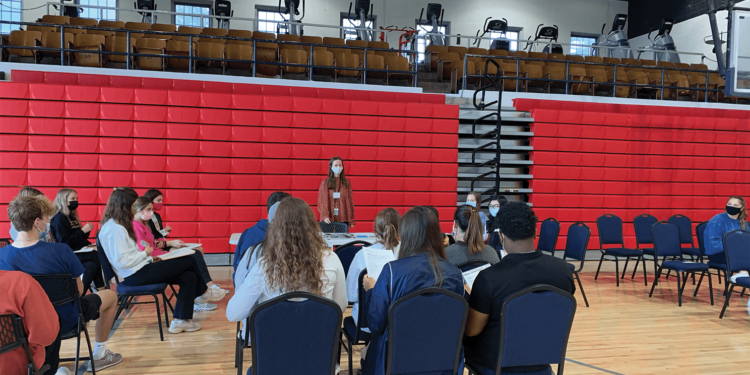By Sophie Higby
On Thursday, Oct. 28, the School of Public Health held its sixth “Rooted and Grounded in Love” event, a Poverty Simulation in honor of President Beck A. Taylor’s inauguration. Taylor began the event by sharing his personal experience. Throughout his childhood, Taylor grew up in poverty and was even homeless at times.
The purpose of this event was to help students empathize with the daily struggles most of the world faces.
“This is really about elevating the life and mission of the university —service, community, faith, academics, and I think this particular event combines many of those components in a really compelling way,” Taylor said.
Although the trajectory of Taylor’s life changed, this is unfortunately not the case for most. It is extremely hard to break the cyclicality of poverty, and the simulation illuminated the struggles behind it.
Participants were divided into groups ranging from one to five people per group, and each person was assigned a role along with a backstory. The simulation consisted of four 15-minute segments. Each segment represented a week.
During each segment, or week, students had specific duties that must be completed. Various services were offered to participants which included community healthcare, a pawn shop, bank, daycare, police department, social services and employers.
The volunteers attending the event were composed of professors at the School of Health as well as community representatives. One representative was Gerica Cammack, who had faced these struggles firsthand.
“I was interested because it was situations I’ve been in myself,” Cammack said. “It really hits home to me. Your situation can change at any time, so just be mindful.”
Students learned how quickly and easily situations can turn for the worse. During the simulation, freshman Lizzie Pike formed what she referred to as a “thieving trio,” which was intended to be a gang.
“We had a good plan and then we got robbed. Things happen that you can’t plan for,” Pike said.
As the simulated weeks went on, people began to grow more desperate. By the end of the third week, over 25% of the students in attendance had been kicked out of their homes and were living at the homeless shelter.
“The first week we were just living, and the fourth week we were trying to survive,” junior Sophie Houser said.
Students were able to experience the hardships that can come with managing money.
“As soon as you pay a bill you have another one. — you can never get your head above the water,” freshman Rainey Bardolf said.
The employment center appeared to be the most popular center. Many students spent their entire time in line waiting for a job, only for there to be none available. After a while, students were sprinting toward the table.
“It’s just disheartening to know that there aren’t any jobs open, you can try all day,” sophomore Mary Morgan Williams said.
The simulation ended with a reflection time where students joined in groups and discussed.
“I was the caretaker for my siblings. It was stressful, because now we have nowhere to live. What can I do now? It felt like I had already failed at that point,” Williams said. “I think it just shows that most of the time, circumstances are out of your control.”
Overall, the simulation was a success, and it allowed students to broaden their worldviews.





